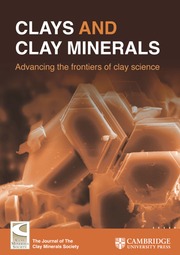Article contents
A Theoretical Study of the Effect of Carboxyl Hydroxamic Acid on the Flotation Behavior of Diaspore and Aluminosilicate Minerals
Published online by Cambridge University Press: 01 January 2024
Abstract
The collector for separating diasporic bauxite serves as a type of flotation reagent by adsorbing selectively on diaspore to make it hydrophobic enough to separate it from the aluminosilicates. Although the flotation process is considered economical in the desilication of Chinese diasporic bauxite, the existing collectors fail to separate these ores because of their poor adsorption selectivity over other minerals. The present study was an attempt to seek a collector for selective flotation of diaspore over aluminosilicates. A novel carboxyl hydroxamic acid compound, 2,2-bis(hydroxycarbamoyl) decanoic acid (BHDA), was designed and synthesized, and the flotation behavior of diaspore, kaolinite, and illite was investigated by flotation tests with BHDA. The interactions between the BHDA and the minerals were also explored by Fourier-transform infrared spectroscopy (FTIR), zeta-potential measurement, and density functional theory (DFT) calculation. Using BHDA as the collector, the pulp pH value affected the floatability of diaspore significantly while the floatability of kaolinite or illite was unaffected or only slightly affected. The dosage of BHDA had little effect on the floatability of the three minerals. The greatest difference in floatability between diaspore and aluminosilicates occurred at mid-range pulp pH (7). Large shifts in characteristic absorption peaks and new absorption peaks were observed for BHDA-treated diaspore but were absent from BHDA-treated aluminosilicates. The change in the negative zeta potential of diaspore was also greater than those of aluminosilicates in the presence of BHDA. The O atoms in the carboxyl and hydroxycarbamoyl of BHDA have highly negative charges, and favorable stereo conditions existed to form five- or six-membered rings, resulting in their coordination with the Al atoms of diaspore, leading to chemisorption in chelate rings; the adsorption of BHDA on kaolinite or illite, on the other hand, was mainly physical in nature. The BHDA was, therefore, highly selective in the flotation between diaspore and aluminosilicates and possibly suitable for the separation of diasporic bauxite.
- Type
- Article
- Information
- Copyright
- Copyright © Clay Minerals Society 2012
References
- 6
- Cited by


